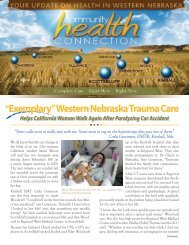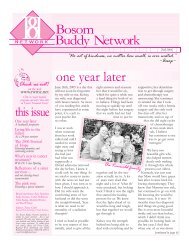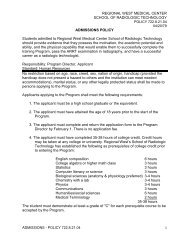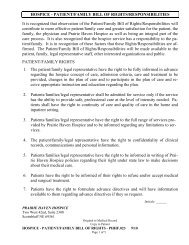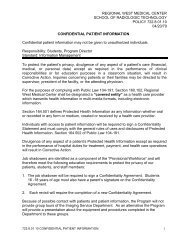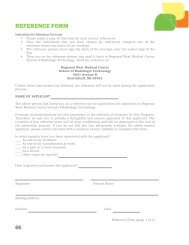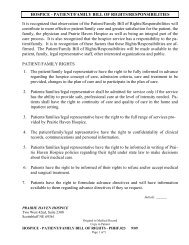2010 Annual Report - Regional West Medical Center
2010 Annual Report - Regional West Medical Center
2010 Annual Report - Regional West Medical Center
You also want an ePaper? Increase the reach of your titles
YUMPU automatically turns print PDFs into web optimized ePapers that Google loves.
Cancer Support GroupsDealing with disease in a positive way“I’m a firm believer in support groups,” says Cancer Treatment<strong>Center</strong> social worker and support group facilitator Carol Diffendaffer.“After attending a few meetings people usually feel likethey’re not alone anymore—it’s a great comfort knowing otherswith similar experiences.” She adds that those attending cancersupport groups learn to be advocates for themselves while developingcoping skills.The list of topics covered at meetings is diverse. In addition tosharing concerns and disease processes, topics include:• Healthy foods and exercise• Discussions about body image• Sexual changes and concerns• Perspectives of young survivors and those of varying ages;learning to move forward after a cancer diagnosis• Coping skills• Living with fatigue and side effects from treatment• Clinical trials• Advocating for yourself• Relationships• Regaining health“No subject is taboo,” says Diffendaffer. “Anyone can utilize thebenefits of a support group—as a matter of fact they’re every bitas important for the support person as for the cancer survivor.I definitely encourage support persons to attend the groups aswell.”Diffendaffer points to a study conducted at Ohio State Universitythat supports the benefits of support groups. Ohio State Universitypsychologist Barbara Anderson asked 58 women who had justundergone breast cancer surgery and were facing chemotherapyto gather weekly with a psychologist. No topic was discouraged—the women shared their fears and concerns, ways to improve eatingand exercise habits and feelings about sex and body image.They also learned techniques for relaxing their muscles in orderto better deal with stress.The results paid off. Blood tests taken four, eight, and 12 monthsinto the study showed the women who got support had far lowerlevels of the stress hormone cortisol—which dampens immuneresponse—than women in the control group (who did not attendsupport groups). The blood samples also revealed that supportgroup members had 25 percent higher amounts of a breast cancerantibody.Diffendaffer encourages anyone interested in a support groupto get on the mailing list for upcoming meetings. Call the CancerTreatment <strong>Center</strong> at 308.630.1348.• Complimentary treatments and techniques• Spirituality7




